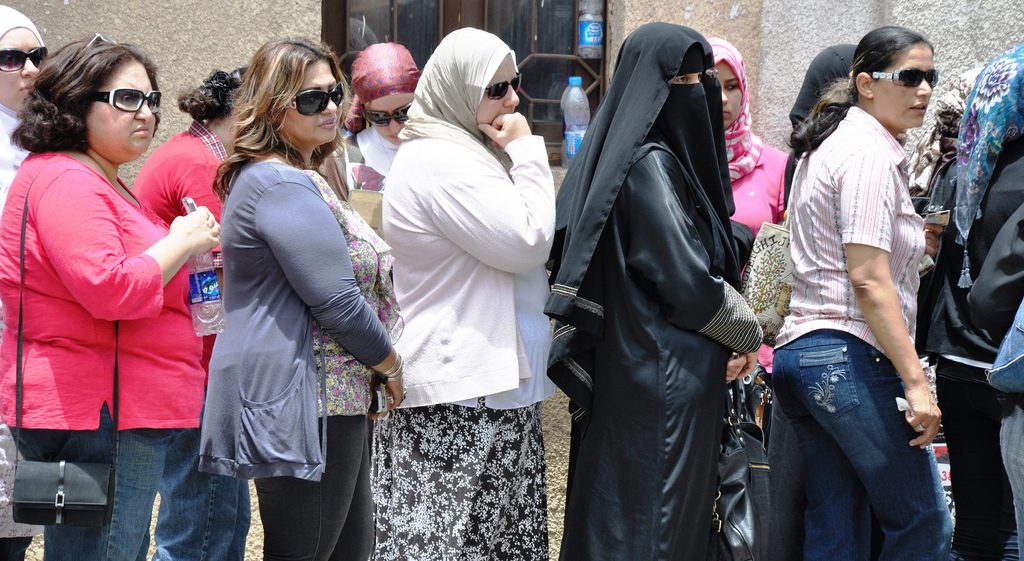
The Muslim Brotherhood’s statement last week on the draft of a document produced by the UN Commission on the Status of Women, and the slapping of a female activist protesting on Egyptian Woman’s Day in front of the Muslim Brotherhood headquarters, have once again drawn attention to issues surrounding women’s rights in Egypt. Several commentators have weighed in on the most recent controversies. Here are some excerpts:
International Women’s Day and Egyptian Women’s Day: Hopes and Fears
Writing in Al Shorouk, former parliamentarian Ziyad Baha’ Al Din surveys the state of women’s rights after the January 25th Revolution, noting escalating fears that the progress made in this area over the last century is threatened by a “slow change in the nature of Egyptian law” stemming from a “murky” and “contradictory” constitution, as well as troubling dynamics in the nature of violence against and sexual harassment of women in Egypt. Despite this, he concludes, there is cause for optimism:
The women of Egypt know that they have rights and that they will get them sooner or later. Years of education, women in different areas of the workforce, the activities of women’s associations and organizations, the fierce legal battles and the valuable gains; all of this has had an impact that cannot be ignored nor undone. But perhaps more important than all of this is that the issue of women’s rights – maybe more so than any time in the past – no longer concerns only the elite, but rather has become a popular issue touching every house and society, even if the form of expression differs.
In Huriya wa Adala, the media outlet of the Freedom and Justice Party, Camilia Hilmi – the president of the International Islamic Commission for Woman and Child – argues that the document drafted (PDF) by the 57th Session of the UN Commission on the Status of Women was the latest attempt by “global secularism” to destroy the family under the guise of international conventions on women’s rights, gay rights, and gender equality. Echoing the sentiments of the Muslim Brotherhood’s earlier statement, she writes:
With a little objective study of these documents, we find that they are as far as could be from protecting rights, just as they don’t respect the religious and cultural diversity of the peoples of the earth. They work to impose a monolithic culture. They impose on us a reality not related to our societies in any way, and then based on this perspective, force upon on us solutions to this imaginary reality.
The United Nations is working through these documents to intervene – under the pretext of protecting women and girls from violence – in the most private aspects of family life, including the extremely private relationship between a husband and his wife, and the relationship between the father and his children.
On Those Who Are Vile, and the Degradation of Women in the Era of the Brotherhood
Writing in Al Youm Al Saba’, Fatima Kheir takes aim at an organization that she calls neither “Muslim” nor “Brothers.” Focusing on the assault on the activist Mervat Moussa in front of the Muslim Brotherhood Headquarters, she writes:
A man slapping a woman! An appropriate headline for Egyptian Women’s Day! Fit for the front page of the international papers, for the news bulletins, and for YouTube videos. But I refuse this as an inheritance that I give to my daughter. I will not leave her a country where women are degraded. I will not teach her that men are allowed to slap women. I will not tell her that Egypt is a country not suitable for her. I will leave a country that is fit for my daughter – a woman who is fully human, enjoying dignity in a society that respects her.
Concern About the Status of Women in Egypt
Writing in Al Masry Al Youm, Hassan Nafi’a reviews the history of the women’s rights movement, both globally and in Egypt, beginning in the mid-1800s. After a detailed discussion touching on the 1919 Revolution, the global spread of the idea of “Women’s Day,” and the granting of the franchise to women after the 1952 Revolution, he writes:
I don’t think that anyone can contest the importance of the role that Egyptian women played in starting and shepherding the January Revolution towards its goal of deposing the head of the former regime. There is also no controversy that the Egyptian women…dreamed at that time of a new government that would achieve social justice for all and guarantee real political participation in the making of their future for men and women alike. However, it has become clear that no wind has come to fill the sails. Egyptian women have started to feel, based on developments in Egyptian political life after the revolution, a pronounced concern that what the struggle for (women’s rights) has achieved may be undone.
Photo: UN
Image: Egypt%20Women%20UN.jpg
